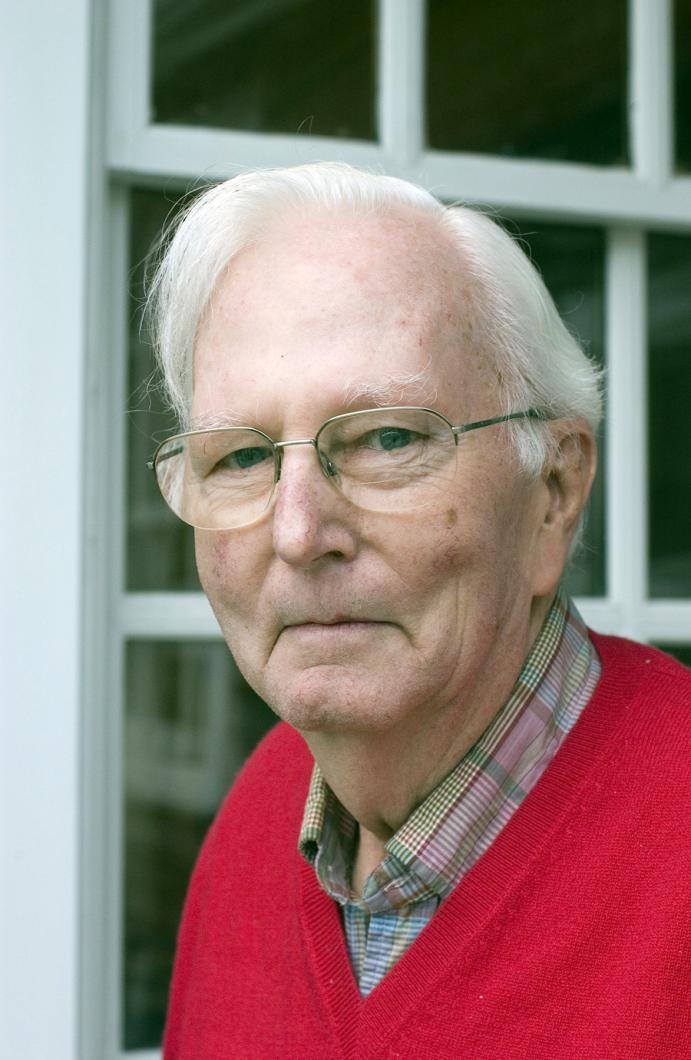Longtime Aquinnah moderator Walter Delaney remembers, years ago, spotting an unexpected visitor sneak into a town meeting. It was a warm summer night, and he had just gaveled the meeting to a close when a skunk strolled through the front doors and settled in beneath a chair in the back of the room. Calmly, the moderator directed the other meeting attendees out the side door, careful not to alert them to their curious guest and spark a potentially smelly panic.
“They never knew why,” he said Wednesday from an armchair in the porch office of his Aquinnah home, the day after he bid farewell to his role as moderator. “The skunk stayed right there. We all left town hall, left the doors open, and the skunk was gone the next morning.”
It was just one of many colorful anecdotes he has collected in his 35 years as town moderator.
But now, at 80, he will finally have the chance to see town meetings from a different angle. After his farewell speech, which opened Aquinnah’s Tuesday night special and annual town meetings, Mr. Delaney turned the meeting over to moderator Michael Hebert and took a seat next to his wife, Nancy. “When I sat down, it was the first time I’ve sat in the audience in 35 years,” he said.
He was a seasonal resident of Aquinnah in May of 1975, when he got a 7 a.m. call from local real estate broker Nell Howell. She had two questions: did he plan to attend town meeting that night, and if so, would he accept the nomination of moderator?
“How it came about, I have no idea,” he confessed. He was nominated from the floor that evening, and took out election papers at the next annual town meeting.
“It’s been very interesting. Challenging. It took me a while to adjust to town meeting the way they had it then,” he said. “It took me a couple of years to get used to the people in town. I wouldn’t say I knew all of them, like I do now. But they were very respectful of me. And I appreciated that. We just went with the breeze.”
Things were different then. The first town budget that passed under his rule as moderator was just shy of $175,000. This week, the budget approved by voters was nearly $3 million. “That just goes to show how the town grew,” Mr. Delaney said.
And he’s grown right along with it, from a summer resident who kept largely to himself, into the widely-known, involved, and respected year-round resident he is today.
Mr. Delaney worked in newspapers, then press manufacturing, for several years before he opened his own business, the Walter E. Delaney Company. He married his wife, Nancy, after a year of courtship in 1951, and they spent two weeklong vacations at a friend’s cottage on the Vineyard before deciding to purchase their own summer retreat in 1961. With their daughter, Gayle Delaney, they divided their time between their home in Woburn and their cottage on the north shore. He retired to the Island full-time in 1991, but not before he’d made a name for himself in the community.
Through the years, Mr. Delaney served as a Martha’s Vineyard land bank commissioner, town auditor, and vice chairman of the Gay Head taxpayers’ association. At the state level, he served as a board member on the hearing committee of the Massachusetts Board of Bar Overseers.
He also served for nine years on the board of selectmen, and was elected fire chief in 1994, a position he still holds today. He is also a member of the conservation commission.
“I’ve always said, I wish I’d kept a diary,” said Mr. Delaney. “There are a lot of things I can remember that really were interesting.”
He remembers the years when the Wampanoag tribe was trying to gain federal recognition as some of the most interesting — and the most challenging.
“I started to get a little more involved in town politics at the time,” said Mr. Delaney. He recalled the meeting on Nov. 19, 1985, when the town finally voted to support the tribe’s bid for federal recognition. “Just prior to our holding our last special town meeting for the final vote, the general court in Massachusetts passed a law that television cameras were to be allowed at open meetings in the state. They were barred from televising prior to that. Aquinnah was the first town in the state to allow national television,” he said.
He adjusted gracefully to presiding over a meeting in a room full of cameras, trying to keep order by requiring cameramen to stay at the back of the room. “It went very well,” he said, for the most part. When one cameraman tried to film people as they signed in and then voted, he stepped in. “I just shut him off immediately. He gave me some back-talk, and I just said ‘You’re either out of here, or I’m going to remove you.’”
The man backed off, and the groundbreaking meeting continued.
He was always fair. He presided over dozens of meetings in his signature red, row by row allowing voters an orderly platform from which to speak on controversial issues. “I would give them at least two chances, sometimes three, depending on the topic. I always allowed them to speak freely, and probably was noted for letting them go on too long from time to time.”
Now he hopes to spend his time focusing on his role as fire chief, but he’s glad he was able to make it to what was meant to be his last meeting as moderator. “I wasn’t going to go, and I said, I just can’t walk away from it like that.”







Comments (2)
Comments
Comment policy »